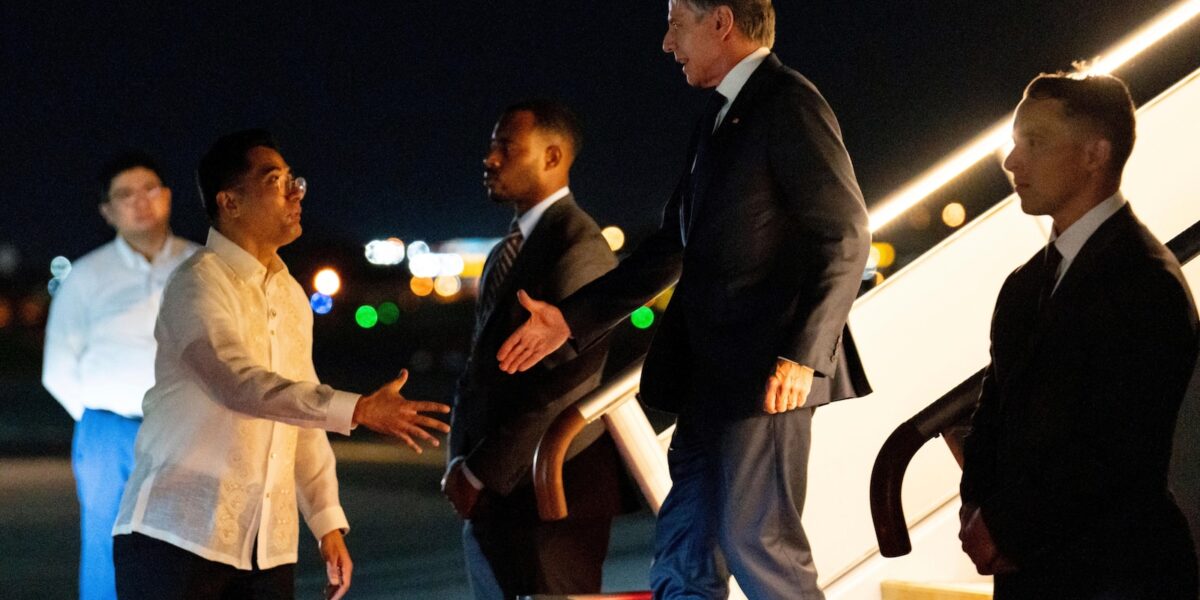MANILA, Philippines — Washington’s top diplomat and defense chief, in Manila for talks Tuesday, will announce $500 million in military funding to boost Philippine defenses and progress in a proposed military pact, given that China’s increasingly aggressive actions in the region “will not stop,” a Philippine official said.
U.S. Secretary of State Antony Blinken and Defense Secretary Lloyd Austin called on President Ferdinand Marcos Jr., who has fortified Manila’s decades-old treaty alliance with Washington as hostilities between Philippine and Chinese forces flared since last year in the disputed South China Sea. Marcos has underscored the need for a U.S. military presence for Asian stability and peace.
After the most violent faceoff between Filipino and Chinese forces on June 17 in the Philippine-occupied Second Thomas Shoal, the countries announced an agreement last week on a temporary arrangement to prevent such clashes in the future. Philippine forces transported food and other supplies and a fresh batch of navy personnel Saturday to Manila’s territorial outpost at the shoal, which has been closely guarded by Beijing’s forces, but no confrontations were reported for the first time.
The Philippines, however, would continue strengthening its territorial defense with the assistance of the U.S. and other friendly military powers and build new security alliances, Philippine Ambassador to the U.S. Jose Manuel Romualdez said.
“The non-confrontational resupply and rotation is purely temporary. The People’s Republic of China will not stop and we are determined just as well,” Romualdez told The Associated Press.
The $500 million in U.S. military financing to be announced by Austin in Manila would include funding for various Philippine navy equipment. About $125 million would be used for constructions and other improvements in areas within Philippine military bases to be occupied by U.S. forces under the 2014 Enhanced Defense Cooperation Agreement of the longtime treaty allies, Romualdez said, adding that the funds were approved with strong bipartisan support in the U.S. Congress.
The U.S. military funding may double next year “depending on our capacity to absorb it.” Romualdez said.
Progress in negotiations on a proposed military pact, the General Security of Military Information Agreement would also be high in the agenda of the talks between Austin and Philippine Defense Secretary Gilberto Teodoro Jr., Romualdez said.
The agreement, which Washington has forged with other allied countries, would allow the U.S. to provide high-level intelligence and more sophisticated weapons, including missile systems, to the Philippines with an assurance that such intelligence and details about sophisticated weapons would be closely kept secret in a highly secured manner to prevent leaks, a Philippine official told AP on condition of anonymity because of a lack of authority to discuss the issue publicly.
Philippine efforts to obtain sophisticated weapons from the U.S. military in the past, including during a major siege of Islamic State group-aligned militants on the southern Islamic city of Marawi in 2017, have been hampered by the lack of such agreement, the official said.
Meanwhile, Romualdez said, “absolutely,” that U.S. support to the Philippines would not change regardless of who becomes America’s next president. Numerous countries have expressed concerns about the implications of former President Donald Trump returning to the White House in January after President Joe Biden withdrew and threw his support to Vice President Kamala Harris.
“Both Republicans and Democrats are in full agreement for the Philippines,” he said, adding that both sides have given their assurances of continued support to Manila.
Marcos approved last year an expansion of U.S. military presence in four more Philippine military camps under the 2014 defense agreement and the largest war drills between Filipino and U.S. forces have been staged under his administration in the country, drawing opposition and alarm from China, which said that increased deployments of American forces would endanger regional peace and security.
Marcos, Teodoro and the Philippine military have responded to that by saying the Philippines has the right to move to safeguard its territorial interests and national security.


